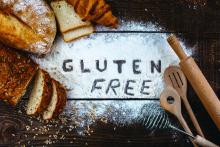CHICAGO – A gluten-free diet is often implemented by patients before they are evaluated for celiac disease, which, in turn, does not allow for accurate celiac disease testing.
A new study shows, however, that measuring serum cytokines following a gluten challenge may allow an accurate diagnosis of celiac disease to be made, even after patients have been on a gluten-free diet.
Levels of IL-2 and IL-8 were increased 2-4 hours after ingestion of gluten. Elevations in other cytokines occurred less frequently, and changes in cytokine levels were similar in both serum and plasma.
At 4 hours post–gluten ingestion, serum IL-2 and IL-8 were significantly higher than after ingestion of a placebo.“IL-2 is a cytokine produced exclusively by T cells and goes up from 2 hours after gluten consumption in celiac patients and is highly specific,” said study author Robert P. Anderson, MD, of Immusant, Cambridge, Mass., who presented the findings of his study at Digestive Disease Week®. “Rises in IL 8 are less but significant as well.”
The authors note that individuals who are already on a gluten-free diet and who would like a definitive diagnosis of celiac disease all too often refuse or are unable to tolerate a gluten challenge for the time period that is needed – usually 4 or more weeks – for the serologic and histologic markers of celiac disease to become abnormal.
Dr. Anderson pointed out that elevated plasma levels of IL-2 and IL-8 accompanied by gastrointestinal symptoms have been observed 4 hours after receiving a single dose of Nexvax2, a therapeutic vaccine being developed by Immusant. The peptide-based vaccine is intended to protect against the effects of gluten exposure while maintaining a gluten-free diet in HLA-DQ2.5+ patients with celiac disease.
In this study, Dr. Anderson and his colleagues hypothesized that patients with celiac disease who were on a gluten-free diet would also exhibit elevated serum IL-2 and IL-8 after an oral gluten versus placebo challenge.
The cohort was comprised of 21 adults with HLA-DQ2.5+ celiac disease who were compliant with a gluten-free diet and who were randomized to consume either vital wheat gluten flour (5 g; ~ 3 g gluten) or a matched gluten-free flour drink (placebo) over 10 minutes.
Blood was collected prior to the challenge and then at 4, 6, and 24 hours afterwards. In addition, patient vital signs and reported outcomes were recorded hourly, and adverse events were tracked from day 1 to day 6.
At 4 hours after ingesting gluten, serum IL-2 and IL-8 were both significantly higher, compared with placebo.
“There was a 20-fold increase in IL-2 after gluten was consumed, between 3 and 5 hours afterwards,” said Dr. Anderson. “IL-8 went up but not as much.”
The median change from baseline for IL-2 after gluten intake was 19.5 ([7.0-47.1], vs. 0.7 [0.5-1.2] for placebo; P = .0001). For IL-8 it was 2.4 (1.2-4.9) vs. 1.1 (0.8-1.2) (P = .012).
Patient-reported outcomes were worse among those in the gluten group (7/12), compared with the placebo group (3/9), after 3 hours but did not reach statistical significance.
He added that his team is in the process of conducting a further study to assess the diagnostic utility of measuring cytokine activity.
Digestive Disease Week® is jointly sponsored by the American Association for the Study of Liver Diseases (AASLD), the American Gastroenterological Association (AGA) Institute, the American Society for Gastrointestinal Endoscopy (ASGE), and the Society for Surgery of the Alimentary Tract (SSAT).

